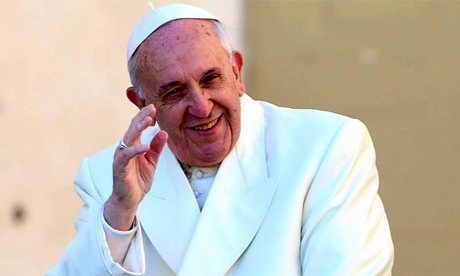Shortly before leaving the Capitol for the holiday recess, Senate Democrats gathered behind closed doors to lay out an agenda for 2014. When the majority leader, Harry Reid, exhorted colleagues to “deal with the issue of income inequality,” the talk took a spiritual turn.
“You know,” declared Senator Bernard Sanders, the Vermont independent, who caucuses with Democrats, “we have a strong ally on our side in this issue — and that is the pope.”
That Mr. Sanders, who is Jewish, would invoke the pope to Mr. Reid, a Mormon, delighted Roman Catholics in the room. (“Bernie! You’re quoting my pope; this is good!” Senator Richard J. Durbin of Illinois recalled thinking.) Beyond interfaith banter, the comment underscored a larger truth: From 4,500 miles away at the Vatican, Pope Francis, who has captivated the world with a message of economic justice and tolerance, has become a presence in Washington’s policy debate.
As lawmakers return to the capital this week and mark the 50th anniversary of President Lyndon B. Johnson’s declaration of a “war on poverty,” Democrats — including those Catholics whose politics have put them at odds with a conservative church hierarchy — are seizing on Francis’ words as a rare opportunity to use the pope’s moral force to advance issues like extending unemployment benefits and raising the minimum wage.
“He has given a number of us in the political ranks encouragement, and really a challenge, to step up and remember many of the values that brought us to public life,” Mr. Durbin said.
Francis’ denunciation of an “economy of exclusion” goes to the heart of the debate between the two parties over the role of government. Democrats like Mr. Durbin and President Obama — whose administration is facing off against Catholic nuns in the Supreme Court over birth control provisions in his health law — quote the pope in speeches, using his words to reinforce their positions. Republicans find themselves forced to justify votes to cut food stamps and unemployment benefits even as they try to counter the perception that they are indifferent to the poor.
But though the pope has caused unease among Republicans as they reconcile his critique of capitalism and “trickle-down theories” with their free-market views, some Catholic Republicans see opportunity in his words.
Representative Paul D. Ryan of Wisconsin, a potential 2016 presidential candidate who speaks of poverty in the context of his faith, has praised Francis for “breathing new life into the fight against poverty,” and is working on a Republican plan to address the issue. Newt Gingrich, the former House speaker and now a co-host of CNN’s “Crossfire,” said he would talk more about poverty on the program.
“I think every Republican should embrace the pope’s core critique that you do not want to live on a planet with billionaires and people who do not have any food,” Mr. Gingrich said. “I think the pope may, in fact, be starting a conversation at the exact moment the Republican Party itself needs to have that conversation.” Continue reading
Image: ABC News
Additional readingNews category: Features.




